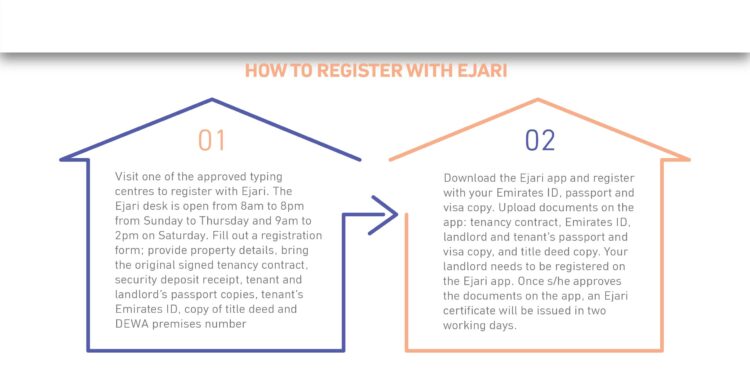

Managing Director, Exclusive Links Real Estate Brokers
Dubai real estate is in hot demand. Once you’ve decided on a property, it’s essential to have your documents in order to finalise your application and offer. Here’s a list of all you need as per Dubai Tenancy Laws.
To secure a property, you are required to pay a refundable deposit to the landlord. Ask your agent to confirm the property ownership before issuance of deposit, or you can validate this yourself here.
Once you have paid the security deposit, be sure to request a receipt and a copy of the landlord’s passport.
Remember, before signing a contract, you should thoroughly read through each clause, making a note of anything you do not fully understand. Never leave room for ambiguity, as this means a clause may be open to interpretation later down the line, and potentially not in your favour.

Ensure you receive a receipt of payment for the agency fee, as well as copies of each rent cheque.
In English, Ejari translates to ‘my rent’. The Ejari system is a contract registration platform administered by the Dubai Land Department (DLD) to authenticate rental contracts and agreements between tenants and landlords.
Ejari Registration is mandatory — the system is in place to make sure all private rental contracts are drafted into legally binding documents and structured in the government-approved format.
Registering the tenancy contract with the Ejari is the responsibility of the landlord. Typically, the landlord will assign this to the real estate agent. However, in practice the tenant will complete the process and pay the required fees.
You must be sure that all deposits, contract duration and rent amounts are clearly stated in your Ejari.

Visit one of the approved Ejari typing centres with these documents:
There are Ejari typing centres in Al Manara Centre, Al Barsha Mall, Oud Metha, Port Saeed or Zabeel.
The general Ejari desk timings are from Sunday to Thursday between 8am to 8pm, on Saturdays from 9am to 2pm and during Ramadan from 8.30am to 4.30pm on weekdays only.
However, always double check your preferred locations business hours.
Alternatively, you can register your tenancy contract and upload your documentation using the Ejari official app.
To use this method, your landlord must be registered on the Ejari also.

Once registration is complete, you will receive the official Ejari contract which includes a unique Ejari ID number. This number is used to register for your DEWA account, which you can now conveniently complete online.
Ejari certificates must be cancelled by either the former tenant, the landlord, real estate agency or property management company. They do not cancel automatically on tenancy expiry. If this has not been done, it will prevent and delay your registration and certificate.
Newly integrated systems between Ejari and DEWA mean you will receive a DEWA connection process electronically once your Ejari contract has been registered.
Once received, here’s the next steps:

In some cases, previous renters may not have settled their DEWA bill before leaving the premises, meaning you will be unable to obtain your connection until the outstanding payment is settled.
Be sure to confirm with the landlord that all final bills from the previous tenant have been paid before signing your contract.
No worries. We can send you a pdf copy to read when you have more time. Just let us know where to send it (the process takes 5 seconds only)
District cooling, or chiller, refers to the centralised production and distribution of cooling energy in the building. Emicool and Empower are the main providers in Dubai.
Landlords and building owners are legally required to include chiller fees in the total rent, as the law stipulates they are responsible for service and maintenance charges of district cooling. However, in some cases, landlords will allow you to pay the chiller fees in exchange for negotiating a lower annual rent.
Some popular communities in Dubai, such as Downtown Dubai, Arabian Ranches, The Springs, The Meadows and Dubai Marina, require tenants to produce a move-in permit before they occupy an apartment or villa.
Check with the real estate agent or landlord whether this is a prerequisite of your area, and where to obtain the necessary forms – typically, they will be available on the developers website.
Documents required in addition to a move-in form are:
An essential part of the approval process to obtain your move-in permit will include a review of service charges, and if there are any outstanding payments, your move-in request may be denied. For buildings, the service elevator needs to be booked and a refundable deposit to protect against damages may be requested by building management. Again, always best to check these details with your real estate agent or landlord.
Before you finalise and sign your tenancy contract, you need to agree on the frequency of rental repayments, commonly referred to as number of cheques. Most landlords will accept two to four cheques. Typically, less cheques come with the bargaining power of negotiating lower rent.
In more popular or upscale communities, such as Downtown Dubai, landlords can insist on one or two cheques.
More commonly, it is the trend for landlords to accept multiple cheques.
To ensure perfect completion of cheques make sure you use your best handwriting as this is the number one reason for cheques being rejected, then follow the simple instructions below:
Date format is MONTH/DATE/YEAR.
This can be written as either 09/21/2019 or September 21, 2019
Note the name of the person, or company, to whom you are making payment.
Double check if spelling and information is correctly stated.
In the small box on the right, clearly write the amount in numerical format. For example, AED 20,000.
Express the amount written in step 3, in words. For example, twenty thousand.
The most important step in writing a cheque is signing at the bottom right-hand corner. It confirms your agreement to pay the stated amount to the payee.
You must ensure your signature matches the signature provided to the bank when you first opened your account. If these signatures do not match, many banks will reject the cheque.

No worries. We can send you a pdf copy to read when you have more time. Just let us know where to send it (takes 5 seconds)
